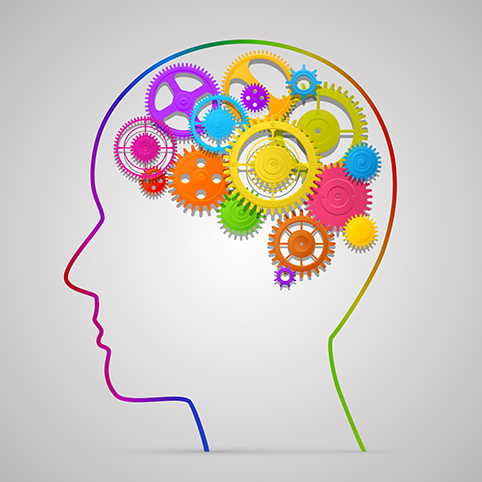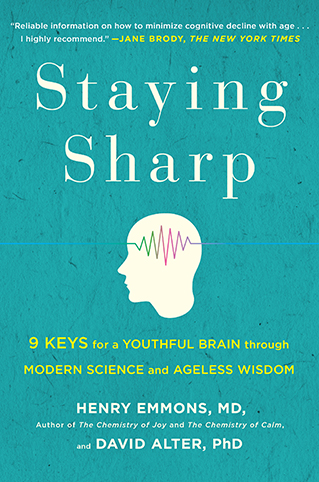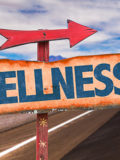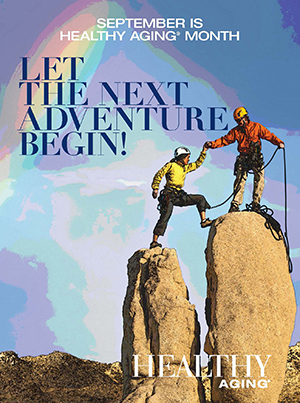 By Henry Emmons, MD and David Alter, Ph.D.
By Henry Emmons, MD and David Alter, Ph.D.
What happens to the “three-pound universe” that is your brain will have a lot to do with how you feel about your own aging.
We believe that there are three universal desires shared by all of us as we age: to remain healthy and vital with our memory reasonably intact; to be engaged and enlivened by our day to day activities and encounters; and to love and be loved—remaining connected to family, friends and community.
We might wish that these things would just happen by chance, without much effort on our part. That may be true for you, but it may not. Whatever your age, no matter how healthy you are at this moment, you are wise to take action now to protect your brain, to enliven your mind and to awaken your heart.
Based on our research of the latest findings in neuroscience, the new science of the brain, we have one very important lesson to share with you: the choices you make today will determine whether you create a healthier, happier, more connected tomorrow … next year … and over the next several decades.
None of us has to be perfect in making these choices, but we encourage you to thoughtfully make a healthier choice more often than not.
Let us introduce you to three of our keys with examples of some simple steps you can take right now to ensure a better tomorrow.
A Youthful Brain is Well Rested
Good quality sleep is non-negotiable for brain health, and in many ways, it is the lynchpin for good memory and mental health. When we sleep well, everything about the brain works better—and it happens immediately. Sleep improves your mood, clears your mind and repairs your body. If you are not sleeping well now, start with this incredibly important key and learn everything you can to improve your sleep.
While it is true that many of us sleep less as we age, it is a myth that older adults need less sleep. Many of us simply can’t sleep well for a wide variety of reasons, including discomfort, illness and medications. Here is one simple, surprisingly effective and seldom-used strategy to improve your sleep: closely manage your exposure to light.
Like all mammals, our bodies receive a powerful daily signal from nature—the rhythm of light and dark. We are meant to get bright light during the day, each and every day and very little light at night.
To better align with your natural biorhythms, try to give yourself at least an hour of very bright light early in the day. It’s best to get it from the sun, but if that isn’t possible (e.g. during the winter in northern areas), you can buy an inexpensive device like a dawn simulator, which gradually brightens your bedroom, tricking your brain into thinking the sun is rising. Even more powerful is a blue-spectrum light therapy device that you can use for 30 minutes any time in the morning, though earlier is better.
In the evening, take great care to minimize your exposure to light. Turn off your room lights and screen devices one to two hours before bed; read with very low-level light from a small book light or a backlit screen; and if you need a nightlight for safety, be sure it is very dim and does not have any blue-spectrum light.
A Youthful Brain Cultivates Curiosity
When you expose yourself to something new, you may feel uncomfortable at first. Your brain finds novelty to be challenging, which may even leave you feeling slightly befuddled for a moment. But for your brain health, that’s a good thing.
The mental thrill of finding creative solutions to such challenges tickles your brain’s pleasure centers with molecules of dopamine that help focus attention on new solutions and lock them into your memory. That’s why it is so important to develop the skill of curiosity. Deliberately seeking what is new and different leads to greater mental flexibility and helps you remain adaptable and resilient throughout your life.
Here is one easy way to exercise your curiosity muscles. The next time you face a choice between doing the same old thing you always do or something new and bold, choose the option you haven’t done before. It may be as simple as listening to different music, taking a new way home from work or going to dinner with new friends.
With time, you can challenge yourself with things that are more difficult. This is neuroplasticity at work. You are forcing your brain to make new connections, and if you keep challenging yourself in this way, you will create new brain pathways that will serve you well in the coming decades.
A Youthful Brain is Well Connected
 One of life’s greatest rewards is undoubtedly our degree of connection to others. Surprisingly, it is also perhaps the most potent of brain fertilizers, helping to establish more new neurons and greater connectedness between brain cells than almost anything else you can do.
One of life’s greatest rewards is undoubtedly our degree of connection to others. Surprisingly, it is also perhaps the most potent of brain fertilizers, helping to establish more new neurons and greater connectedness between brain cells than almost anything else you can do.
We are, after all, social beings. Enriching your social connections protects you from one of life’s greatest stresses—the fear and anxiety that can arise from a sense of loneliness or isolation. Seeking genuine connections with others activates empathy circuits that lie deep within your brain, strengthens the channels between your brain’s centers of emotion, reasoning and judgment.
In short, deepening your connections to others makes you more flexible, compassionate and emotionally balanced—i.e. a person with equanimity and substance. Here is a simple first step. When you encounter someone you know, be aware of the tendency to exchange perfunctory greetings—How’s it going? Fine, and you?
Instead, take just a moment to prolong the encounter. Ask a real question, something that you are genuinely curious about. Take time to actually listen to their response. Make the interaction a tad more “meaningful.”
Make this a practice that you can use to awaken the desire to connect with others. When you do this repeatedly, you are creating a new habit of the heart that will make your brain sing at any age!










